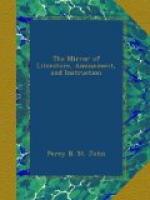“Like unscour’d armour, hung by the wall;”
and we hope the forcible positions of the truths he has here inculcated, will bestir others from their laxity. The most attractive sketches in the series are the Gipsy Girl and De Lawrence. In the latter there are scenes of considerable energy and polish. The hero, a profligate, after abusing all the advantages of fortune, commits a forgery, and is executed. The sympathies of an affectionate wife, in his misery and degradation, tend to heighten the interest, and point the moral of the story; his last interview with the partner of his woe is admirably drawn, as are some caustic observations on that most disgusting of all scenes—a public execution and its repulsive orgies. We give a portion of the interview, which appears to us to contain some fine touches of deep remorse:—
“Accompanied by her parents and her infant, she alighted at the tavern which adjoined the prison-house. Her father went immediately to arrange for the interview; which, as the time of execution drew nigh, must take place instantly or not at all. Habited in deep black, which, from the contrast, made the pale primrose of her cheek still paler, entered his drooping wife; bearing on her bosom, “cradled on her arm,” their child, happily unconscious alike of its father’s ignominy—its mother’s sorrows. With uncertain steps she tottered towards him. He advanced to her embrace, at first, with coolness and deliberation; but when her altered look, on which care had engraven an accusation that smote with the chill of death his guilty heart—her lack-lustre eye—her form almost reduced to a shadow—met his glance, his resolution dissolved before them: the better feelings of his nature, long lulled by habitual vice, and fixed in inertion by the flattering commendations of his spiritual guide, burst forth afresh like a stream long pent up, and overwhelmed him with their gush. He sank upon one knee, and received his wife and child falling into his embrace. His haughty spirit was humbled, was softened. He could have borne her curses with indifference, he could have returned a formal adieu with equal formality—he had expected to encounter a scene, and was made up accordingly: but to look upon her thus—her days gone like a shadow—to witness her sunken eye filled with beamings in which he alone was enshrined—to see her meek and forgiving, whose light heart had been turned to sorrow, whose gay morning dreams had been turned to sad realities, whose confidence had been abused and happiness wrecked,—all, all by his baseness and treachery:—to behold his forsaken wife, superior to all this, clinging to him for his last farewell, as if she and not himself were the offender, was beyond his expectation. He knew he had merited curses and hate, and he met with affection and tenderness; his heart yearned—a sensation of admiration for her virtues and constancy came over him, and, ere it had possessed him entirely, it humbled his proud spirit—it undeceived his false expectations. “My God, I have not deserved this!” burst from his swelling heart. A tear, such as he had not shed since he left the paths of innocence, stole down his cheek. Fervently, truly, affectionately, he blessed his wife and child.”




